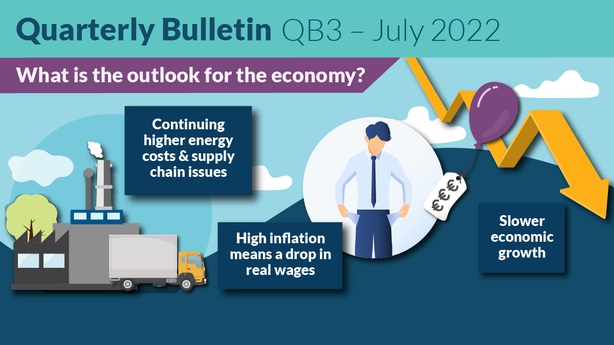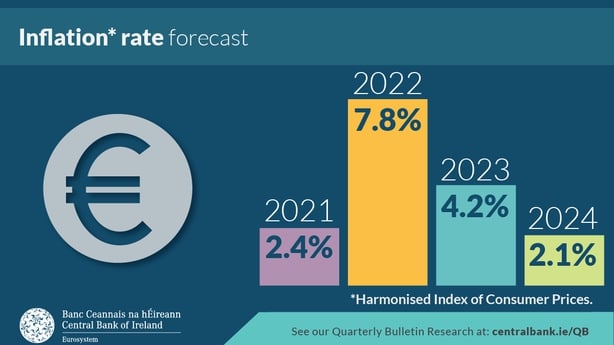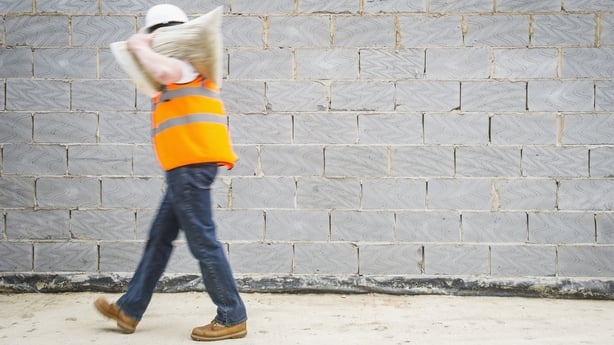The Central Bank has warned that inflation could peak in the coming months at over 10% but should start to decline after that.
In its latest Quarterly Bulletin, the bank also says household incomes will decline this year but are expected to recover next year with strong wage growth.
It also describes the current high levels of corporation tax as "the main risk to our public finances".
After the peak, the Central Bank said it expects inflation to average out at 7.8% this year before falling to an average of 4.2% next year.
This will eat into household disposable incomes which are expected to fall by just over 3% on average, for the first time in a decade.
The bank says Government action on energy taxes has limited the negative impact on incomes.
Next year, it is pencilling in wage growth of 6.6% but warns that wage increases will be uneven across the economy with bigger gains in high-growth sectors like technology.
This will be as much a response to a strong rebound in the labour market as it has to do with workers striking higher wage bargains to compensate for inflation, according to the bank.

On the public finances, the bank describes the current bumper levels of corporation tax as the "main risk to our public finances".
It calculates that if corporation taxes were to be reduced permanently by €8 billion to more closely reflect the actual performance of the economy, it would significantly increase the Budget deficit and add to the national debt.
The Central Bank points out that much of the windfall in corporation tax in recent years has been funnelled into permanent increases in public expenditure.
We need your consent to load this rte-player contentWe use rte-player to manage extra content that can set cookies on your device and collect data about your activity. Please review their details and accept them to load the content.Manage Preferences

It agrees with the proposition from the Fiscal Advisory Council that current and future windfalls from corporation tax should be saved in a Rainy Day Fund.
It repeats concerns outlined in the Summer Economic Statement earlier this week that over half of all corporation tax comes from just ten multinational firms concentrated in just two industrial sectors: pharmaceuticals and IT.
We need your consent to load this rte-player contentWe use rte-player to manage extra content that can set cookies on your device and collect data about your activity. Please review their details and accept them to load the content.Manage Preferences
The Minister for Finance said the Central Bank comments are in line with the tone of the Government's Summer Economic Statement, released earlier this week.
"I was very very explicit in acknowledging that this, while it is a source of receipts to us in the future, could be a source of risk to us in the future too," he said.
"But it is also why we put such effort to ensuring that the latest increase in corporate tax receipts that took place across 2021 and is taking place in 2022 has fed into an improvement in our national financial position as opposed to it being used to fund higher levels of spending."
"And in particular the €3 billion of increased receipts that we have taken in for this year is the key component in the €4.3 billion surplus that the half year exchequer returns pointed to."
He added that the high level of corporation tax receipts during the pandemic played a critical role in improving our debt position while we had to fund immense economic responses to the pandemic.
"For last year and for this year, the improvement in corporate tax receipts did not lead to a change in our expenditure plans, it led to an improvement in our national finances," he said.
On housing, the bank forecasts that output should be back up to 31,000 units a year by 2024.
But between this year and 2024, the bank estimates that problems in the supply of building materials as well as construction inflation will result in 5,000 fewer units being built than had been previously forecast.

It has reduced its forecasts for growth in the domestic economy, as measured by Modified Domestic Demand, this year to 4.3% and next year to 4.2%.
However, it has revised upwards its forecast in its April bulletin for GDP growth in the economy this year to from 6.1% to 9.1% based on the continuing strong performance of the export sector.
Lower growth in the domestic economy is due to consumption by households declining in the face of higher inflation and concerns about the future.
It considers risks to its forecasts on growth as being on the "downside" while there is an upside risk to its forecasts for inflation.
Goodbody chief economist Dermot Mr O'Leary said today that the Central Bank has brought down its forecast for growth but very modestly and it is still looking at growth of over 4% in modified domestic demand in 2023.
"We'd have a more pessimistic view, mainly because we would be more pessimistic on the real income squeeze for Irish consumers because of inflation," he said.
"This is a theme globally," he said.
"I think we could possibly see downside risks to those forecasts from the Central Bank. I would particularly point out, when you look across the Atlantic, we are heavily dependent on the US and we are starting to see signs of a slow down there led by what the Federal Reserve is doing, raising interest rates to slow down their economy," the economist added.





